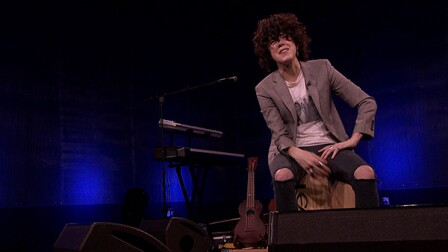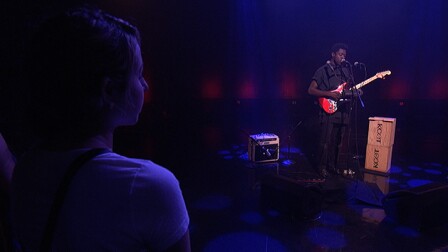
Maya Jupiter's Transnational Hip Hop
L.A.-based vocalist Maya Jupiter's sound is a mixed palette, shifting from politically charged rap, to soulful breakdowns, to the lurching beats of dub and reggae. Her music obliterates boundaries between genres, offering up a taste of diverse sonic cuisines. As a charismatic frontwoman, Jupiter channels multiple identities on-stage -- from the hip hop MC to an edgy pop songstress -- but her wide-ranging music is held together by a message of hope and justice. On "Songs of Freedom," she raps: "All the struggle in suffering we endured through life, makes it hard for me to sleep at night / thinking about what can I do to make to make a difference, come to terms and understand the true meaning of resistance."
The mash-up sound of Jupiter's music, feels like a journey across the radio dial; it almost seems like her music is searching for a home of its own. For Jupiter, the liminality of her music also reflects her own multicultural identity. Jupiter was born Melissha Martinez in La Paz, Mexico, but grew up in Sydney, Australia. Her father was Mexican and her mother Turkish. Her hyphenated identity always came with a story, as she often had to relate the international path that landed her in Australia's big city.
"I always joke that we went the wrong direction," she says. "We were the first of our family to migrate to Australia. It was difficult growing up without family around and especially not knowing other Mexicanos, for me. There was a large Turkish population [since] Sydney is very diverse. It was hard not to know who I was as a Mexicana, as a Mexican woman."
Her childhood was scored to the soundtrack of Turkish pop and Spanish language songs resounding throughout her home. But she spent her teenage years in salsa and Latin American clubs. Hip hop -- the cross-cultural language connecting geographically distant, but ideologically conjoined urban areas -- became her artistic vernacular, her weapon of choice. "I started taking it seriously when I left high school and discovered the hip hop community in Sydney," she says, "which was made up of people of all disciplines: MCing, breaking, graffiti, turntablism, I just immersed myself in that culture and fell in love and wanted to participate in any way I could."
When she turned 18, she changed her name to Maya Jupiter, to reflect her Mexican roots. At school, she had been bullied, and her distinct heritage had placed her on the societal periphery. Later, the fringe became the vantage point from which she wrote her songs, as an outsider looking in. "I identified with hip hop," she says, "Hip hop became my culture because people from anywhere could be hip hop."


Jupiter went on to become a host on Australian youth culture television and radio shows, and performed with Son Veneno, an 11 piece Latin band. "I became a radio and television host because I really believed in putting the Australian voice on the map," she says. "I didn't grow up seeing women like me on television, so I liked the idea of changing the face of what it really means to be Australian." Her music is the epitome of the code-switch, deftly bouncing from accent to accent, from American slang to Chicana cadences to Australian flourishes. "As I started to search for my identity, what I discovered, I would put into music," she says. "My hip hop was never straight beats and rhymes, it was always sampling Latino music. I had salsa in one of the first songs I ever did, I had Spanish in my choruses."
She moved to Los Angeles in 2008, where she met her future husband, contemporary soul singer Aloe Blacc. With Blacc backing her up, Jupiter collaborated with Grammy-winning son jarocho group Quetzal, who provided the instrumentation for her 2010 self-titled album. "I had a friend introduced me to Quetzal Flores and Martha Gonzales of the Chicano rock band Quetzal," she says of her new experience in Los Angeles. "It was just the right moment. They had just come back from Mexico. We had about six jam sessions, and from that came this music." Their musical partnership developed into a community for the Australian ex-pat. "They brought community, introducing me to the Chicano/Chicano community here in East L.A. I've been adopted, they call me the Chicana from Down Under." The collaboration continues pairing the multicultural flavor of Quetzal fronted with the powerful vocals of Jupiter. Her song "Inshallah," segues into dubby bass and percolating drumbeats, as Jupiter ruminates on the future. "All I can write about is my experiences as a new mother," she says of her young daughter. "'Insha'allah' means god willing. This is something universal. For me at the time, it was about this life coming to earth and the prayer that we have that this baby is safe and everything turns out okay."
On Jupiter's latest song "That Ain't Me," she almost delivers a punkish snarl over power chords, putting those who try to categorize her on blast. Jupiter's story is all her own, and she calls the shots. And as she proclaims: "You're telling me what I'm supposed to be, but I'll tell ya right now, that it ain't me."











